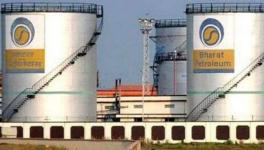Disinvestment of BPCL: Global Energy Giants Eye Indian Market

As the central government is keen on achieving its disinvestment target of 1.05 lakh crores by selling off central public sector enterprises (CPSEs) in this fiscal year, the government’s stake in Bharat Petroleum Corporation Limited (BPCL)—which has been scheduled to be lined up for strategic sale—is likely to be acquired by foreign energy giants.
Soon after the launch of the disinvestment drive, global energy giants Saudi Aramco, Rosneft, Kuwait Petroleum, ExxonMobil, Shell, Total SA and Abu Dhabi National Oil Corporation have had a conversation with the concerned authorities and these giants are likely to bid for the government’s stake in BPCL, Livemint reported.
“While a formal interest from the potential bidders is expected in due course, all the above names are part of the list that the government reaches out to,” a source told Livemint.
At present, government holds 53.3% stakes of BPCL and the companies may bid for government’s share either individually or as part of a consortium.
BPCL has four refineries in Mumbai, Kochi, Bina (in Madhya Pradesh) and Numaligarh (in Assam) with combined capacity of converting 38.3 million tonnes of crude oil into fuel. It has also 15,078 petrol pumps and 6,004 LPG distributors across the country.
“We expect significant interest for the government’s stake in BPCL. The company’s downstream business is quite promising and it is the most professionally run organisation among oil marketing companies,” a source was quoted as saying.
The procedure to hire investment bankers, legal advisor and asset valuer to execute BPCL stake sale is being handled by the Department of Investment and Public Asset Management (DIPAM).
“DIPAM would appoint an advisor and a valuer in November. The valuation report is expected to be submitted in 50 days,” the report added.
So far, in this financial year, 2019-2020, DIPAM has collected a sum of Rs 12,357.49 crores through various disinvestment drives. On July 5, Finance Minister Niramala Sitharaman, in her maiden budget, made it clear that the government’s target is disinvestment worth Rs 1.05 lakh crore, which is up from Rs 90,000 crore projected in the interim budget in February this year.
Read More: Govt ‘Haste’ to Privatise BPCL Worries Employees, as Global Monopolies Eye Expansion
Meanwhile, Kerala Chief Minister Pinarayi Vijayan has sought Prime Minister Narendra Modi's intervention to stop the move to disinvest the state-owned BPCL.
In a letter to PM Modi, a copy of which was released for the media, Vijayan said that the Centre had initiated action through release of Request for Proposal (RPF), causing 'severe anxiety' among the general public in the state.
The state government was the promoter of the erstwhile Kochi refinery with 5% stake; it had also extended financial and non-financial incentives to BPCL when the refinery capacity was augmented, he said.
The state government had also agreed to refund the entire ‘Work Contract Tax’ amounting to Rs 85 crore to BPCL as well as to treat the additional VAT revenue, due to the augmented capacity of BPCL, as a soft loan, which is refundable after 15 years, the letter stated.
About Rs 1,500 crore have been advanced in this endeavour and these assistances from the state government was to ensure that the public sector refinery is strengthened, he said.
The Kerala government has proposed setting up a petrochemical park adjacent to BPCL on the assurance that the feed stock from the refinery would be made available.
With the initiation of the disinvestment process, the proposed investment of around Rs 25,000 crore would become uncertain, Vijayan said.
Entrepreneurs who have come forward to invest are faced with the question of whether the feedstock from the refinery would be available or not and if available, what its cost will be, he said.
The state government and civil society are concerned that the BPCL disinvestment would not be in the interest of directly employed over 13,000 persons and contract employees.
The company, which has been making profit all along, has made an investment of more than Rs 50,000 crore in the last five years.
Vijayan urged the prime minister to issue appropriate directions to give up the move to disinvest BPCL and retain it under the present ownership pattern in the interest of the stakeholders and national interest.
Read More: Selling Bharat Petroleum Will Be Like Losing Kohinoor!
However, this is not the first time the government is attempting the privatisation of state-owned BPCL. In 2002, the then BJP-led government headed by Atal Bihari Vajpayee had attempted to privatise BPCL along with Hindustan Petroleum Corporation Limited (HPCL). The government had to drop the plan after the intervention of Supreme Court. The apex court had observed that the government would require Parliament’s nod to proceed with the drive.
At that time, the court had mentioned ESSO (Acquisition of Undertaking in India) Act and Burmah Shell (Acquisition of Undertaking in Inida) Act, 1976 and Caltex (Acquisition of Shares of Catlex Oil Refining India Ltd and all the Undertakings in India for Caltex Inida Ltd) Act, 1977, and had ordered that the government cannot privatise HPCL and BPCL without approaching the Parliament to change the law that nationalised them.
BPCL, which was being converted from Burmah Shell, was nationalised in 1976 by an Act of Parliament. Burmah Shell, which was being set up in the 1920s, was an alliance between Royal Dutch Shell and Burmah Oil Co and Asiatic Petroleum (India).
“There is no challenge before this Court as to the policy of disinvestment. The only question raised before us whether the method adopted by the Government in exercising its executive powers to disinvest HPCL and BPCL without repealing or amending the law is permissible or not. We find that on the language of the Act such a course is not permissible at all,” read the Supreme Court judgement.
The Modi regime in his first tenure annulled 187 obsolete and redundant laws including the Act of 1976 that had nationalised the Burmah Shell under the Repealing and Amending Act of 2016.
Back then, Reliance Industries, BP of UK, Kuwait Petroleum, Petronas of Malaysia, the Shell-Saudi Aramco combine and Essar Oil had expressed their interest to take over these two public sector undertakings.
Read more: ‘Nationalist’ BJP Govt Invites Foreign Takeover, Offers Cheap Indian Labour!
(With inputs from PTI)
Get the latest reports & analysis with people's perspective on Protests, movements & deep analytical videos, discussions of the current affairs in your Telegram app. Subscribe to NewsClick's Telegram channel & get Real-Time updates on stories, as they get published on our website.
























